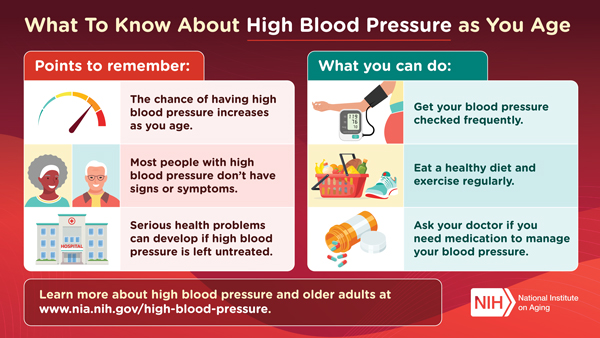
Lifestyle changes you can make to help prevent and lower high blood pressure:
- Aim for a healthy weight. Being overweight adds to your risk of high blood pressure. Ask your doctor if you need to lose weight. In general, to maintain a healthy weight, you need to burn the same number of calories as you eat and drink.
- Exercise. Moderate activity, such as brisk walking or swimming, can lower high blood pressure. Set goals so you can exercise safely and work your way up to at least 150 minutes (2.5 hours) per week. Check with your doctor before starting an exercise plan if you have any health problems that aren't being treated.
- Eat a heart-healthy diet. A balanced diet of vegetables, fruits, grains, protein, dairy, and oils — such as the Dietary Approaches to Stop Hypertension (DASH) eating plan — can lower your blood pressure.
- Cut down on salt. As you get older, the body and blood pressure become more sensitive to salt (sodium), which is added to many foods during processing or preparation. Limiting your amount of salt each day may help. DASH is a low-salt diet.
- Drink less alcohol. Drinking alcohol can affect your blood pressure. For those who drink, men should have no more than two drinks a day and women no more than one a day to lower their risk of high blood pressure.
- Don't smoke. Smoking increases your risk for high blood pressure, heart disease, stroke, and other health problems. If you smoke, quit. The health benefits of quitting can be seen at any age — you are never too old to quit.
- Get a good night's sleep. Tell your doctor if you've been told you snore or sound like you stop breathing for moments when you sleep. This may be a sign of a problem called sleep apnea. Treating sleep apnea and getting a good night's sleep can help to lower blood pressure.
- Manage stress. Coping with problems and reducing stress can help lower high blood pressure.
To learn more, go to https://www.nia.nih.gov/health/high-blood-pressure/high-blood-pressure-and-older-adults.
